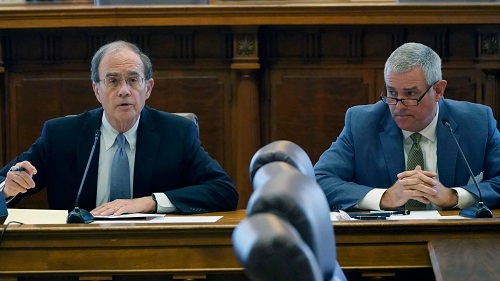
4.10.22 – Daily Journal – JACKSON
Both chambers of the Mississippi Legislature adjourned Tuesday night, capping off one of the most consequential yet chaotic legislative sessions in recent years. Over the course of a few months, lawmakers slashed state taxes, reshaped political power through redistricting and established a medical marijuana program.
“When you contemplate the number of issues that we had before us, it was pretty staggering at the beginning,” Speaker Philip Gunn, R-Clinton, said.
Despite lawmakers agreeing on most of the issues on their agendas, the session was still marred by political infighting and hardball negotiations, often using the press to publicly air grievances instead of working together.
Nevertheless, lawmakers were able to negotiate a historic teacher pay raise plan, create a way to set aside funds for conservation areas and pass an equal pay law.
“Clearly, by any stretch, the Mississippi Legislature performed this year,” Republican Lt. Gov. Delbert Hosemann said.
What happened in the Legislature
Income tax cuts
The fight over cutting the state’s individual income tax dominated the legislative session. Infighting even forced the session to be extended by about a week.
Despite the frequently bellicose atmosphere, lawmakers were able to reach an agreement that will cut state taxes by an estimated $525 million over the next four years.
Starting in 2023, the 4% income tax bracket will be eliminated. The following three years, the 5% bracket will be reduced to 4%.
Medical marijuana
Gov. Tate Reeves in early February signed a bill to legalize medical marijuana for people with serious medical conditions.
The Legislature was backed into a corner and strongly encouraged to pass a medical cannabis program after voters in November 2020 an initiative to legalize medical cannabis.
The state Supreme Court, though, overturned the initiative by ruling it was not properly on the ballot over procedural issues.
The legislation allows for patients with debilitating medical conditions to receive cannabis if a physical, nurse practitioner or ophthalmologist certifies them for the treatment. Patients are allowed to receive up to 3.5 grams of cannabis per day, or around 3 ounces per month.
Teacher pay
Mississippi public K-12 teachers next year will receive pay raises that average more than $5,100, and assistant teachers will receive a $2,000 pay increase.
This is the largest teacher pay raise in several years and contains a pay schedule that will bump teacher pay each year to encourage educators to stay in the state long term.
Outdoor stewardship fund and state parks
Mississippi leaders have failed to maintain the state parks system and have not properly marketed them to attract tourists, according to recent reports.
Newsletter
The Session
But that may soon change. Lawmakers this legislative session set aside millions of dollars in general funds and American Rescue Plan Act dollars to improve the parks system.
Lawmakers also approved an outdoor stewardship plan to preserve and enhance outdoor recreation areas, including state parks. The new fund could be used to draw down federal dollars as well.
Both Sen. Neil Whaley, R-Potts Camp, and Rep. Trey Lamar, R-Senatobia, praised this year’s efforts to improve the parks and believe the state should reap the benefits in the next few years.
What didn’t happen
Restoring the initiative process
Lawmakers failed to agree on a process to allow voters to place issues directly on a statewide ballot to change the state law.
The state Supreme Court invalidated the state’s initiative process over technical issues with the state’s congressional districts, leaving citizens with no direct way to change state laws.
The disagreement between the two legislative chambers arose over the threshold petitioners need to reach in order to place an issue directly on a ballot.
The House argued that the number of signatures should be equal to 12% of the people who voted during the last statewide election for governor. The Senate wants the signatures to be equal to 12% of the registered voters – including those who did not vote – on the day of the last presidential election, which is a much higher threshold.
The required number of signatures of registered voters needed under the House plan would be about 106,000. Under the Senate proposal, it would be about 238,000.
Gunn told reporters on Tuesday that the Senate’s proposed plan was “too high of a hurdle”
“To require 12% of all registered voters – it was just an enormously high threshold that the citizens would probably never be able to achieve if they wanted to put a policy item in front of the voters.”
Extending postpartum Medicaid
The Senate passed a bill to expand postpartum Medicaid coverage for people who have given birth, but the House leadership killed it without offering the entire House members a chance to vote on it.
The state’s current policy allows two months of Medicaid coverage for people after they give birth.
Gunn said he is opposed to legislation that would give the perception that the state is wanting to expand Medicaid, even though the postpartum extension would not add anyone new to the program.
The speaker also said that he has contacted leaders from the Mississippi Division of Medicaid to weigh in on the topic, and they have yet to do so.
Hosemann and Senate leaders were disappointed in Gunn’s reluctance to consider the Medicaid enhancement and have said it should be a pro-life position to want to increase health outcomes for new mothers and their children.
“We have the most difficult births here, we have so many single parents,” Hosemann said. “There are a lot of issues here. We shouldn’t just be clouded by some discussion about a president that was three presidents ago.”
